In recent days I’ve been pondering the nature of ease—thinking about what makes life easier. Convenience, cars, connections, clout. All the things that give you wheels, grease those wheels, and roll you swiftly onward to your desired destination.
And then I’ve been asking myself if easier is better. It’s a bit of a rhetorical question—for me, anyway. But I’ll try to pull you aboard my train of thought and keep it coherent.
This particular train left the station a few weeks ago after a friend of mine moved from Tel Aviv to Philadelphia. She’s an American, but had been living in Israel for years. “I forgot,” she told me, “how convenient America is. You just think of something you want and press a button and then it’s at your door in a matter of hours. In Israel, you had to actually leave your house and go out and look for what you wanted.”
The same is true of Portugal. Although you can get Amazon deliveries in just a few days from Spain or Germany (no more Amazon UK post-Brexit), it’s not quite the same bustling Bezos bazaar as it was in the States. Sometimes I’d place an order at 10 in the morning and a box, bag, or envelope would get shoved through the mail slot by 6 that same night. It was so easy.
The extremity of the ease, of course, led to more online ordering. More pushing of buttons and acquiring of stuff, sometimes without due consideration of actual need. Or even of want. I would buy things because I could, because I saw them, because why not.
It was easy., but it wasn’t always good. Or healthy. Or sane.
Here in this new life in this small country, I go out a lot more. I walk around. I look for what I need. I ask for help, in halting and badly-accented Portuguese, if I can’t find it (Precisa de ajuda). Most of the time what I’m looking for is actually what I need. I have bought a few things just because I wanted them—incredibly fresh cherry tomatoes from the Thursday morning farmer’s market have become an unapologetic addiction. So too, I’m afraid, have these beloved weirdos. I collected an entire shelf of them before I gave it a rest:

But in general, I’m buying less “just because” things. I no longer scroll internet shopping sites to satiate some unspoken (unexamined) ache. I look for what I need, when I need it. The exceptions being eccentric ceramic folks and petite tomatoes.
The lack of ease is something Marido and I deliberately sought out as part of The Great 2021 Uprooting. Would another country have been easier, more comfortable, more “western”—England, Germany, France? Possibly. (Though Brexit really does take the UK out of the running in all the enticing categories except for Windswept Scottish Moors.)
We wanted to be a bit uncomfortable. We wanted to adapt, learn, change—to be forced to do it, by necessity. We wanted to get brave. Get curious. Get out.
For those reasons (and a dozen others), we chose to leave our easy, comfortable, convenient life. And for the most part, for 98.7% of the time, I don’t bemoan that choice.
But some days—when fatigue or fear or frustration* get the upper hand—I find myself asking (really quietly, and only in my head), would this be more comfortable, would this be easier if we didn’t have to learn a new way of being and doing and speaking? Would this be easier if we didn’t have any significant attachments and responsibilities? If we didn’t have a bird, a dog, a kid?
Of course it would. Of course. But I think “Would it be easier?” isn’t the right question to ask.
Because the whole point of this was never easier. It was better.
We came to Portugal because we wanted to live better. We wanted to slow down, slow all of it down—life and work and ambition and time. We wanted to savor more, together. We wanted safer and sweeter and stranger and softer. We wanted European, Mediterranean. We wanted to be the estrangeiros. The newcomers, ready to listen and learn.
We knew it would be difficult, especially this first year. The learning curve would be steep, we thought. And we were right. It was, it is, it continues to be.
We don’t know how to do things here—anything. We are learning it all: how to cross the street, how to pump gas, how to say hello, how to order bread—how to pronounce bread (pão). We don’t understand the red tape here, the particular version of bureaucracy practiced in this country. (People always clutch pearls about “Portuguese bureaucracy” as if the US doesn’t have their own impressively baffling forms and procedures.)
None of this learning is comfortable. None of it is easy. There have been days that I cannot handle going to the grocery store because I am not up for the amount of emotional fortitude it will require just to navigate the aisles. I don’t have the stamina necessary to make eye contact with the checkout lady.
Last night, on a quick run to the nearest Pingo Doce for bread and raspberries—our two main staples, I said “bom dia” instead of “boa noite” and then fumbled around trying to correct myself until I gave up, muttered “Desculpe” (sorry) and showed myself the door.
One of the most difficult and anxiety-inducing parts of our journey so far, has been sending Filha to school. She’s always been a good student; she loves school, she’s curious and bright. But she’s also shy and introspective and would rather read a book than play dodge ball (apple falls close to tree and so forth).
In San Francisco, she attended public school—the same neighborhood school from kindergarten to fourth grade. In fact, she only had one year left at Lakeshore Elementary until she graduated and leveled up to middle school. But on the eve of her final year, we yanked her up by the roots and transplanted her in foreign soil.
We contemplated sending her to public school in Setúbal, but we crossed international schools off the list pretty much immediately. We didn’t want her to be surrounded by other Americans and Brits. We wanted her to meet Portuguese kids, learn the language, acclimate. And we knew it would be a tall order. We knew it would not be easy.
So we chose a small private school. It seems that “private” here in Portugal equates to small, rather than elite or religious, as it does in the States. Filha’s fifth grade class has only eight other students. They’re all Portuguese. Only one of them speaks English fluently, though they are all learning, and most of the teachers are conversant.
Also, there are goats. A whole family of goats.
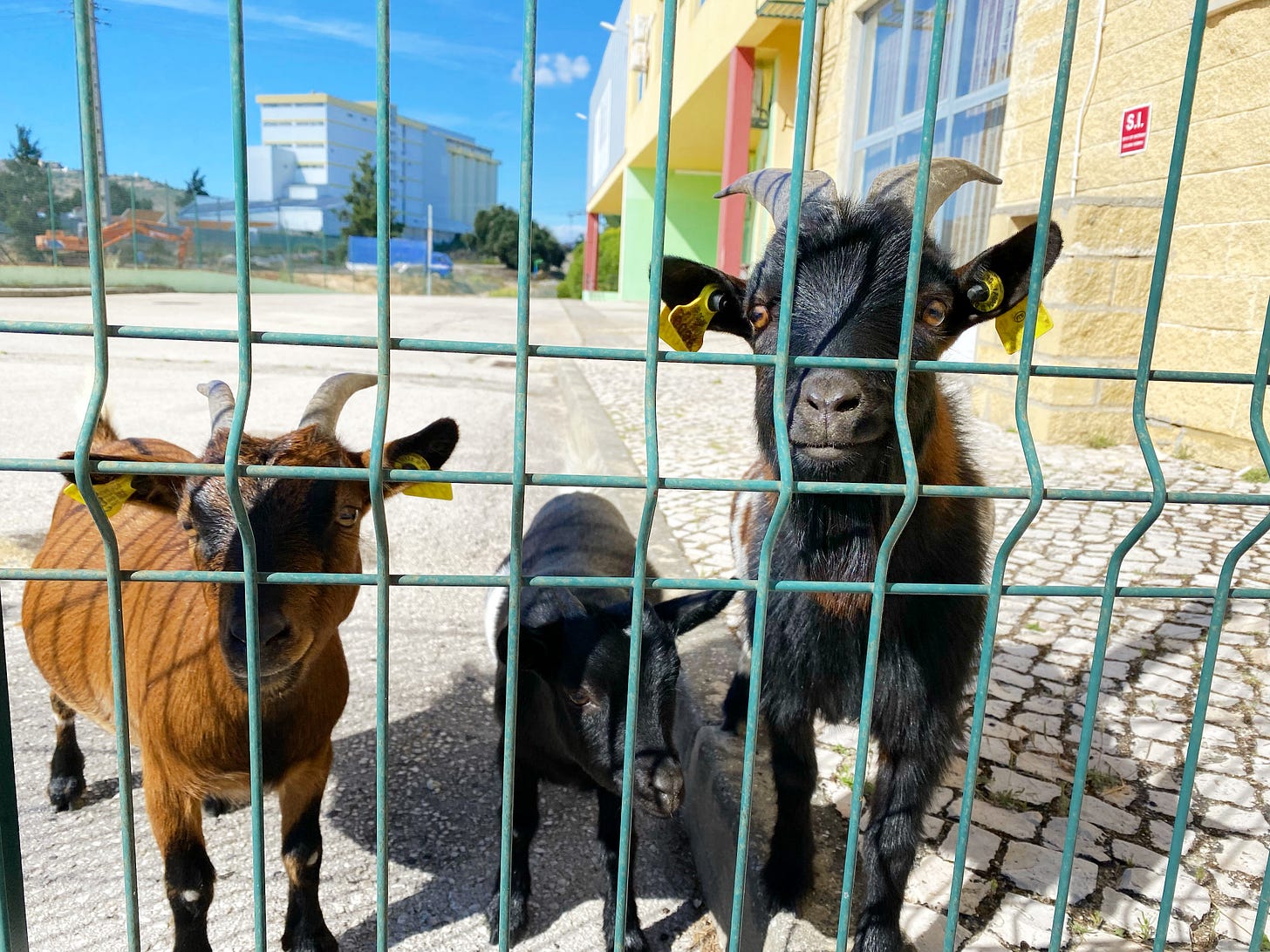
This particular school has a “farm”—a large garden, the three mini-size goaters, and a whole truckload of ducks. During the course of their education, the kids learn about plants and planting and animal care, and every so often a goat wanders into the classroom. (Amendoim interrupted math class last Thursday, much to the students’ delight.)
On paper, this is the perfect place for Filha. It’s small enough that it’s not intimidating and she won’t get lost in the crowd. It’s large enough that it offers extracurricular programs and activities. The school emphasizes sustainable living and espouses environmental causes—two things near to Filha’s heart. The hallways are hung with art. Also, there are the goats.
In practice however, it’s not so easy. She doesn’t speak Portuguese. She doesn’t make friends quickly. She is still mourning the loss of her old school and the distance from old friends. The school staff, the other students—they all make great efforts to help her transition, to make her feel welcome.
But last week she told me, “I just don’t feel like I fit in. I was in class and the teacher was speaking in Portuguese and all the other kids were taking notes and I just sat there staring because I didn’t understand what she was saying.”
My momma heart broke a little. Because of course I don’t want my kid to have a hard time. Of course I don’t want her to feel sad and lonely. I don’t want her to struggle.
And yet. I know that struggling is often how we humans learn, how we stretch ourselves to reach heights we never could have imagined before. So although I wish ease for my daughter, what I really want for her is something more.
I want her to be bilingual. Multilingual, even. I want her to empathize with the person who doesn’t fit in because she herself knows what that feels like. I want her to understand that she is capable of doing hard things. I want her to know that better is worth striving for.
For the last two weeks, I send her off to school each day with a small, attainable goal. “Today, figure out where the bathroom is.”
“Today you’re going to learn how to open your locker.”
“Today, say ‘obrigada’ instead of ‘thank you.’”
In English (Ingles) class, her teacher wrote all the names of colors on the board: red, orange, yellow, green, blue, purple. Then she asked Filha to say them, so the other kids could repeat after her and mimic her enviable American accent. And… Filha did it! She spoke out loud, in front of the entire class. Like it was no big deal.
Tonight, she told Marido and I about the weird face she made for her school photo. And about the game she ended up playing with all eight of her classmates.
“We were playing tug of war with my jacket and then one of the boys, I think it was Filipe, he pulled so hard he fell down and we all laughed and then we were chasing each other around,” she said. “And Mom, I realized all of the sudden that for the first time since school started, I felt like I fit in! Even though we don’t speak the same language yet, we can still laugh and play games together. I feel like my whole class is becoming sort of friends with me.”
She told me this story at dinner. I had to put down my fork so I could properly absorb the miracle. She told Marido on the sidewalk out front. He had to stop walking so he could take it all in.
It’s not easy. But it’s better.
And tomorrow, we’ll all do it again. She’ll head to school. I’ll attempt a conversation with Claudia at the hair salon. Marido will take on yet another bureaucratic immigration hurdle. We’ll keep at it. Because we’re getting somewhere.
We’re getting somewhere good.
*I really hit the alliteration trios hard in this particular entry. That’s what happens when I write fast and forego an editor.
Copyright © 2021 LaDonna Witmer

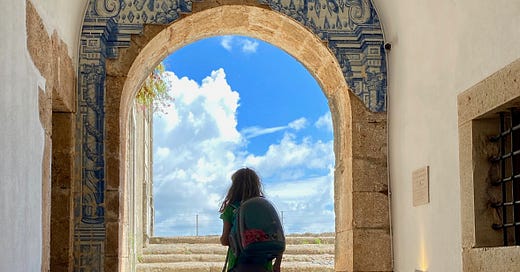




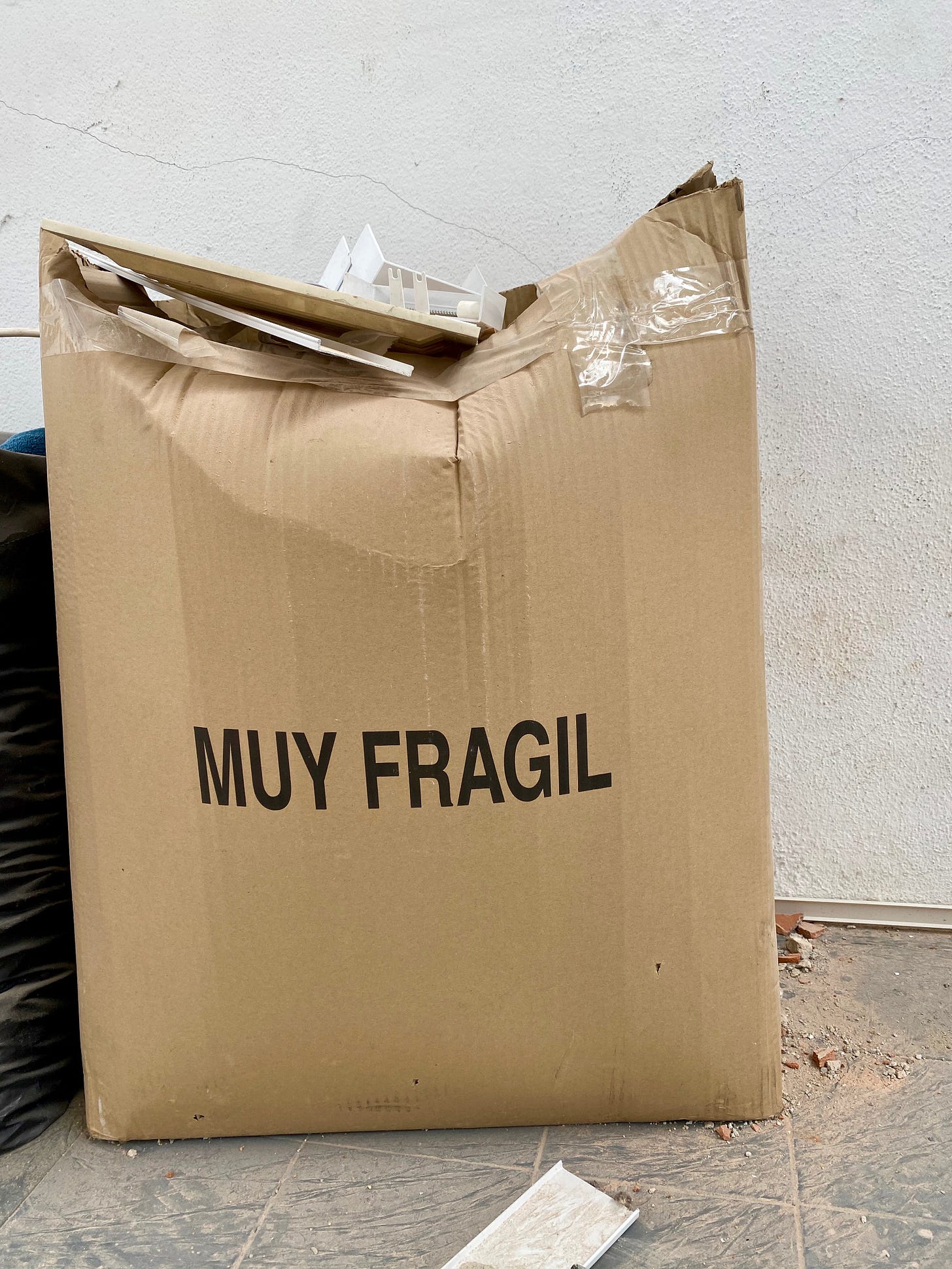
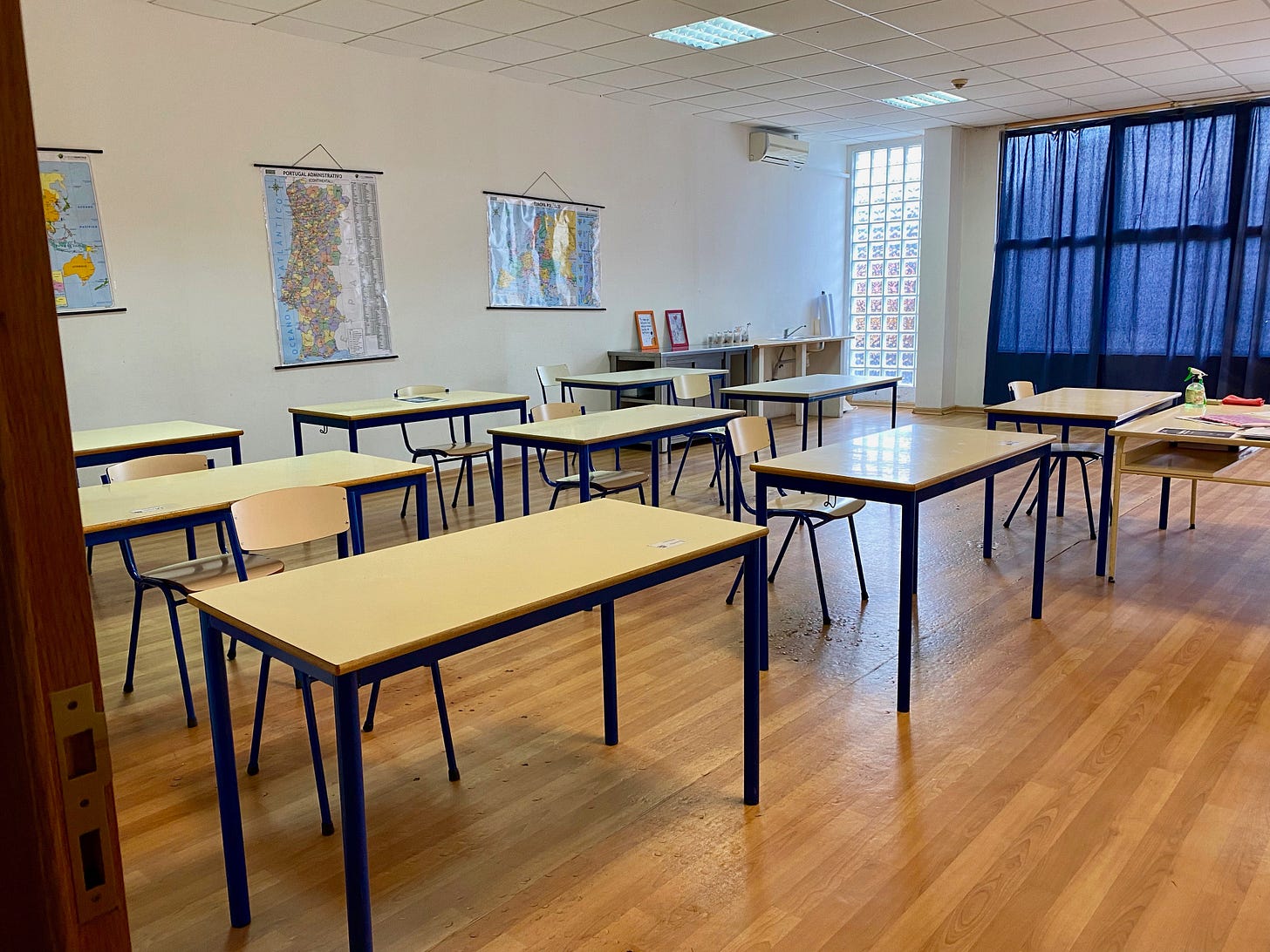
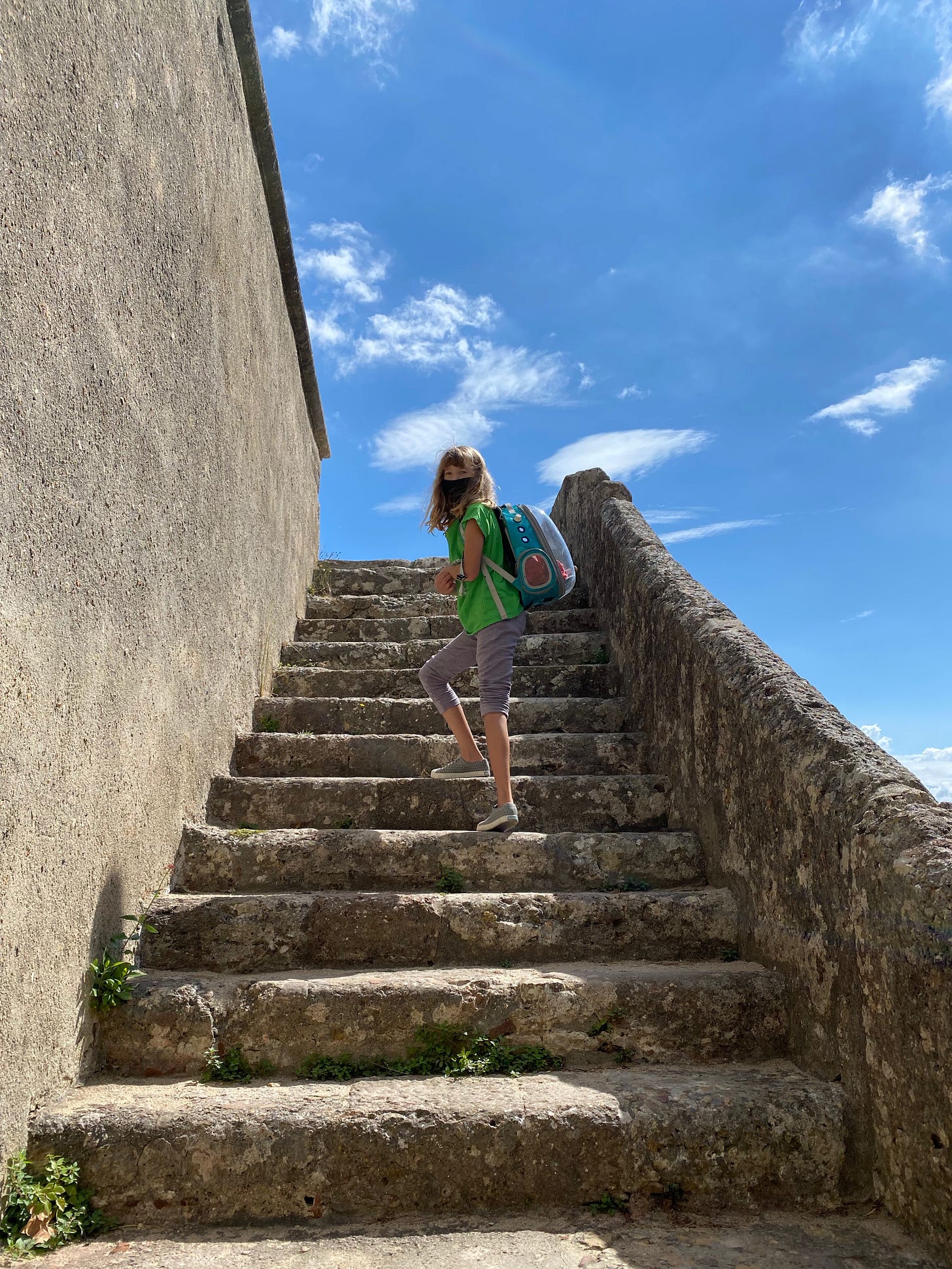
Absolutely beautiful! I needed to read every word of this. Your daughter is lucky to have such a great mom!
Seems that working for something, and waiting for something, creates gratitude.
On a different note: Both of Filha's pictures seem to be climbing to the top of the world and cloud 9. Seems appropriate.